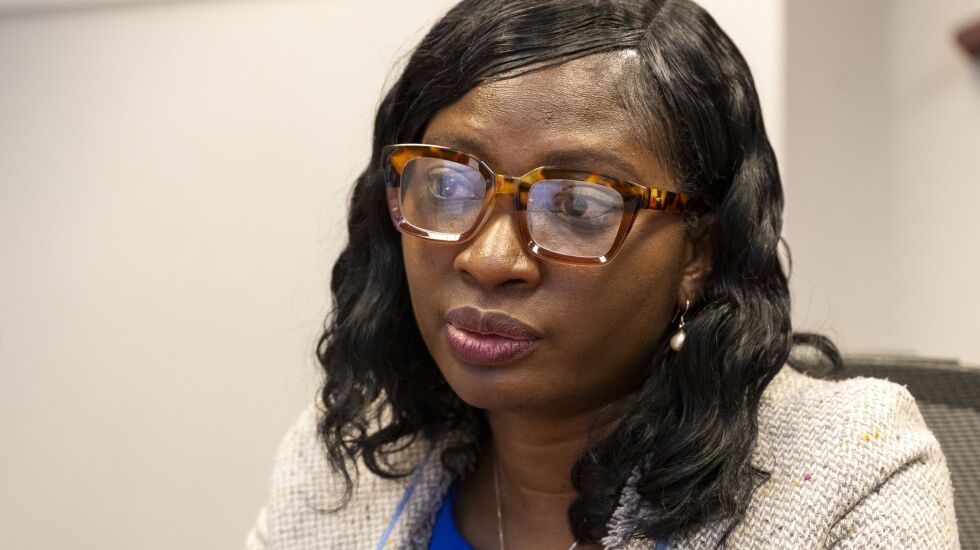
Olusimbo Ige didn’t hesitate when asked recently about her top priority as Mayor Brandon Johnson’s newly appointed public health chief.
“Mental health is overwhelmingly the top concern,” Ige said in an interview. “There is a mental health crisis nationwide, and Chicago is feeling the brunt of that.”
Ige was announced as public health commissioner by Johnson in November just months after the mayor fired Dr. Allison Arwady, a pediatrician and infectious diseases expert who led the city through the COVID-19 pandemic.
Ige is a public health expert — trained in medicine in Nigeria but not licensed to practice in the U.S. — who most recently worked for the Robert Wood Johnson Foundation and previously served as an assistant commissioner at New York City’s health department.
While acknowledging the many challenges the city faces, from the racial differences in life expectancy, a crisis of opioid addictions to the threat of HIV and other infectious diseases, Ige echoed Johnson’s promise to address rising mental health cases, a problem exacerbated by stresses related to the pandemic.
Johnson promised during his mayoral campaign to reopen six city mental health clinics shut a dozen years ago by then-Mayor Rahm Emanuel and also to promote “treatment not trauma,” an alternative approach to mental health emergencies that cuts out police involvement.
Much like the rest of the country, Chicago saw mental health cases rise throughout the COVID years.
“When stresses mount, the crisis balloons,” Ige said.
The estimated number of Chicagoans experiencing “serious psychological distress” jumped almost 70% since 2018 to 239,000 in 2022, according to city data.
Across the country, a quarter of U.S. adults reported symptoms of anxiety or depression in early 2021, though that number has declined, according to San Francisco-based research organization KFF.
In his first annual budget, Johnson provides for two mental health clinics to reopen in the next year. He also announced $66 million to expand city mental health staff, money he called “crucial investments.”
Ige promised to build on existing city programs and describes the Johnson strategy as “starting small right now but our hope is to grow in the next few years.”
Arturo Carrillo, a researcher, activist and critic of the city’s past responses to mental health, said he hopes to meet Ige early next year to talk about her approach to the issue. Former Mayor Lori Lightfoot vowed to reopen the clinics shut by Emanuel but failed to keep her promise or rein in police involvement.
“For us, expanding crisis response without police is a big priority this year,” Carrillo said. He called Johnson’s rhetoric a “notable departure from the previous administration.”
An even greater challenge for Ige and the health department is to reduce the life expectancy gap in Chicago.
White residents, on average, live 10 years longer than Black Chicagoans. Some comparisons of specific white and Black neighborhoods are even more stark with one study showing a 30-year gap between a specific white and Black ZIP Code comparison.
“It is mind boggling and disheartening how wide the gaps are and how wide the inequities and disparities are,” Ige said.
Fixing an inequitable health care system will only create so much progress, she said, while determining the deeper “social determinants of health,” such as healthy food, economic security and safety, are the broader goals to address an inequitable health climate.
“I can treat someone for diabetes, but if they go back to a community where there is no access to good food and healthy food, they’ll keep cycling,” she said.
These systemic issues take time to reverse, she notes.
“Opportunities and resources were tailored for those who were white and privileged and opportunities and resources were limited for people of color,” Ige said.
Ige, 45, grew up in Nigeria where she saw family and friends needlessly die because of poor access to health care, including one sister who died of tuberculosis.
This life experience, she said, drives her to address the many challenges in Chicago.
Opioid-related deaths more than tripled in Chicago since 2015 with 1,441 reported in 2022. Through Nov. 1, the unofficial death count was almost 1,400, according to the city.
Near term, Ige’s goal is to stop the overdoses, while long-term recovery programs will need to address the addiction.
There were more than 900 newly reported cases of HIV or AIDS in 2022, which Ige sees as another troublesome issue to fix.
“Our work is not done,” she says. “We still see new infections and our goal is to get to zero.”







